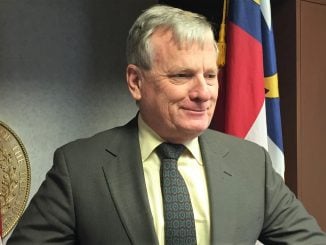
RALEIGH — At the Aug. 3 meeting of the North Carolina Council of State, Gov. Roy Cooper indicated that state unemployment benefits will return to normal levels following the end of the federal unemployment subsidy.
State Treasurer Dale Folwell made an impassioned plea in comments at the meeting, detailing the effect that the extended benefits are continuing to have on employers across the state.
“Every business owner — no matter their race, creed, color or political affiliation — is asking how we can continue to pay into a system that forces us to compete with federal benefits by taxing people who are working, and then using the money for those who don’t,” Folwell said. “The policy is no longer about compassion and generosity, but justice and certainty. At the end of the day, employers across the state who have suffered for over a year during COVID cannot operate without employees. We’re in an employment crisis.”
Scheduled to end on Sept. 6, the added federal benefits for the unemployed are competing with private employers — impacting nearly every industry in North Carolina.
Already, 25 states have ended the extended benefits, a move the General Assembly undertook with the passage of Senate Bill 116 on June 24. Cooper, though, vetoed the bill on July 2.
In a veto message, Cooper said, “The federal help that this bill cuts off will only last a few more weeks and it supplements North Carolina’s state benefits. Prematurely stopping these benefits hurts our state.”
Responding to Cooper’s then-veto, state Sen. Chuck Edwards (R-Henderson) said, “It’s a shame to see Gov. Cooper incentivize people not to work instead of addressing our state’s severe labor shortage. Thousands of jobs are waiting to be filled but this veto ensures that ‘Help Wanted’ signs will remain up for months to come.”
The NC Chamber also supported SB 116, with president and CEO Gary Salamido saying in June that the bill, “Embodies efforts by the House and Senate to provide workable solutions to our state’s acute workforce challenges, including solutions that seek to end our overreliance on federally enhanced unemployment programs and ensure businesses that already received COVID-related assistance funding to maintain their workforce can continue to receive targeted assistance.”
President Joe Biden signaled on June 4 that the benefits will expire and Congress has no plans to take up an extension.
In a statement on the economy, Biden said, “The temporary boost in unemployment benefits that was enacted helped people who lost their jobs through no fault of their own, and who still may be in the process of getting vaccinated. But it’s going to expire in 90 days. That makes sense it expires in 90 days.”
Folwell, who served as assistant secretary of Commerce and led the N.C. Division of Employment Security for two years, said in closing, “Letting these extended benefits expire is the best thing we could do to help employers get reopened. I get calls every day from small businesses that say they can’t get people to work because it’s more profitable for them to stay home.”



